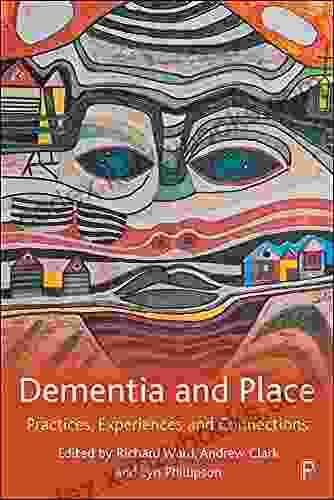Dementia and Place: Practices, Experiences, and Connections - Explore the Profound Link Between Place and Dementia

Dementia is a complex and multifaceted condition that affects millions of people worldwide. It is often characterized by a decline in cognitive function, memory, and reasoning, which can have a significant impact on an individual's ability to live independently and participate in everyday life. In recent years, there has been growing interest in the role that place plays in the experience of dementia. This article will explore the profound link between place and dementia, discussing the ways in which place can both positively and negatively impact individuals with dementia and the implications for care and support.
5 out of 5
| Language | : | English |
| File size | : | 3102 KB |
| Text-to-Speech | : | Enabled |
| Screen Reader | : | Supported |
| Enhanced typesetting | : | Enabled |
| Word Wise | : | Enabled |
| Print length | : | 238 pages |
The Role of Place in Dementia
Place is a complex concept that encompasses both physical and social dimensions. It refers to the spaces we inhabit, the people we interact with, and the activities we engage in. For individuals with dementia, place can play a significant role in their experience of the condition. Positive place experiences can promote well-being, independence, and social engagement, while negative place experiences can exacerbate symptoms and lead to social isolation and exclusion.
Physical Environment and Dementia
The physical environment can have a significant impact on the experience of dementia. Factors such as lighting, noise levels, and accessibility can all affect the comfort and well-being of individuals with dementia. For example, bright and well-lit spaces can help to reduce confusion and disorientation, while noisy and cluttered environments can be overwhelming and stressful.
Social Environment and Dementia
The social environment is also an important factor in the experience of dementia. Positive social interactions can provide individuals with dementia with a sense of belonging and purpose. However, negative social interactions, such as stigma and discrimination, can lead to social isolation and exclusion. It is important to create supportive social environments that promote positive interactions and reduce stigma.
Practices and Interventions
There are a number of practices and interventions that can be used to improve the experience of dementia in place. These include:
- Environmental modifications: Making changes to the physical environment to make it more supportive for individuals with dementia. This can include things like adjusting lighting, reducing noise levels, and providing clear and concise signage.
- Sensory stimulation: Using sensory stimulation to promote engagement and reduce agitation. This can include things like providing music, aromatherapy, or tactile stimulation.
- Social engagement: Encouraging social interaction and participation in meaningful activities. This can include things like joining support groups, attending day programs, or volunteering.
- Person-centered care: Providing care that is tailored to the individual needs and preferences of the person with dementia. This can include things like respecting their choices, involving them in decision-making, and providing support in a way that preserves their dignity.
Implications for Care and Support
The link between place and dementia has important implications for care and support. It is essential that care and support services take into account the role that place plays in the experience of dementia. This means providing support that is tailored to the individual needs and preferences of the person with dementia, and creating supportive environments that promote well-being and independence.
Dementia is a complex condition that can have a significant impact on individuals' lives. However, by understanding the role that place plays in the experience of dementia, we can develop more effective and supportive care and support services. By creating supportive environments that promote well-being and independence, we can help individuals with dementia to live full and meaningful lives.
References
- Alzheimer's Society. (2021). Dementia. Retrieved from https://www.alzheimers.org.uk/info/dementia
- Kitwood, T. (1997). Dementia reconsidered: The person comes first. Buckingham: Open University Press.
- Phelan, A., & Rowlands, I. (2014). Place and dementia: Understanding the role of the environment in the experience of dementia. London: Jessica Kingsley Publishers.
5 out of 5
| Language | : | English |
| File size | : | 3102 KB |
| Text-to-Speech | : | Enabled |
| Screen Reader | : | Supported |
| Enhanced typesetting | : | Enabled |
| Word Wise | : | Enabled |
| Print length | : | 238 pages |
Do you want to contribute by writing guest posts on this blog?
Please contact us and send us a resume of previous articles that you have written.
 Book
Book Novel
Novel Page
Page Chapter
Chapter Text
Text Story
Story Genre
Genre Reader
Reader Library
Library Paperback
Paperback E-book
E-book Magazine
Magazine Newspaper
Newspaper Paragraph
Paragraph Sentence
Sentence Bookmark
Bookmark Shelf
Shelf Glossary
Glossary Bibliography
Bibliography Foreword
Foreword Preface
Preface Synopsis
Synopsis Annotation
Annotation Footnote
Footnote Manuscript
Manuscript Scroll
Scroll Codex
Codex Tome
Tome Bestseller
Bestseller Classics
Classics Library card
Library card Narrative
Narrative Biography
Biography Autobiography
Autobiography Memoir
Memoir Reference
Reference Encyclopedia
Encyclopedia Dr Phil Sabine Hamm
Dr Phil Sabine Hamm Donna Stellhorn
Donna Stellhorn Dmitry Vostokov
Dmitry Vostokov Dr Ida Rolf Institute
Dr Ida Rolf Institute Dorothy Shepherd
Dorothy Shepherd Dr Angelica Giron
Dr Angelica Giron Dr Pk Gupta
Dr Pk Gupta Dr Colleen Trombley Vanhoogstraat
Dr Colleen Trombley Vanhoogstraat Dorothy Duncan
Dorothy Duncan Dr Ashok Kumar Malhotra
Dr Ashok Kumar Malhotra Dorine Lam
Dorine Lam Dr Stephen Sinatra
Dr Stephen Sinatra Dion Rosser
Dion Rosser Dr Kj Foster
Dr Kj Foster Donna Vanliere
Donna Vanliere Donna Kelly
Donna Kelly Dr Prakash Ramchandani
Dr Prakash Ramchandani Dr Earendil Spindelilus
Dr Earendil Spindelilus Dianne Benjamin
Dianne Benjamin Donna Gephart
Donna Gephart
Light bulbAdvertise smarter! Our strategic ad space ensures maximum exposure. Reserve your spot today!

 Quentin Powell50 Cancer Prevention Smoothies Recipe Cookbook For Weight Loss Type Diabetes
Quentin Powell50 Cancer Prevention Smoothies Recipe Cookbook For Weight Loss Type Diabetes Dan HendersonFollow ·11.5k
Dan HendersonFollow ·11.5k Jerry WardFollow ·14.6k
Jerry WardFollow ·14.6k Kenneth ParkerFollow ·2.6k
Kenneth ParkerFollow ·2.6k Dillon HayesFollow ·12.7k
Dillon HayesFollow ·12.7k Max TurnerFollow ·12.9k
Max TurnerFollow ·12.9k Mark TwainFollow ·13.6k
Mark TwainFollow ·13.6k James GrayFollow ·11.7k
James GrayFollow ·11.7k Allan JamesFollow ·2.3k
Allan JamesFollow ·2.3k

 Scott Parker
Scott ParkerTransforming Your Lead Into Gold: The Ultimate Guide to...
In today's competitive...

 Chance Foster
Chance FosterUnveiling the Secrets to Herpes Healing: Dr. Sebi's...
Herpes is a common viral infection that...

 Greg Cox
Greg CoxLose The Gluten Lose Your Gut Ditch The Grain Save Your...
The Revolutionary Guide to Healing Your Body...

 Gene Powell
Gene PowellMedically and Spiritually Treating Chronic Thyroid...
Unlocking the...

 Jonathan Franzen
Jonathan FranzenBax And His Bubbles: The Perfect Book for Bath Time and...
Bax And His...
5 out of 5
| Language | : | English |
| File size | : | 3102 KB |
| Text-to-Speech | : | Enabled |
| Screen Reader | : | Supported |
| Enhanced typesetting | : | Enabled |
| Word Wise | : | Enabled |
| Print length | : | 238 pages |












